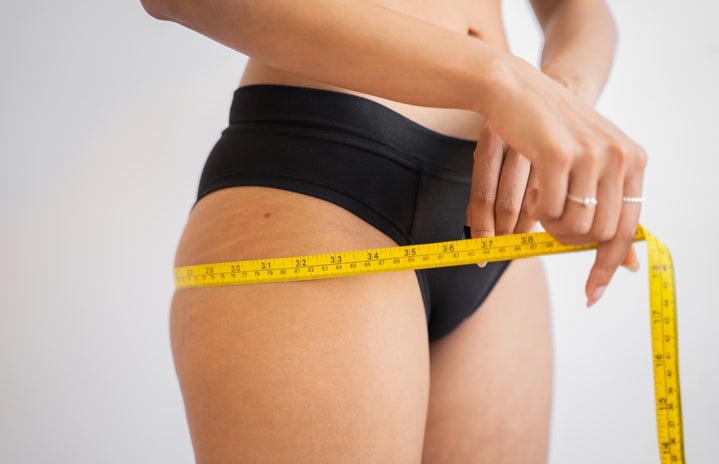[Trigger Warning: This article discusses diet culture and eating habits, which may potentially be triggering to some readers.]
The holidays have always been my favorite time of the year. Growing up, I would look forward to the array of chocolate cookies and platters of homemade mac ‘n cheese. However, now that I am older, I’ve realized that I have become subconsciously afraid of the holidays. It’s not that I’ve become afraid of Santa or seeing distant family members — I’m afraid of eating too much and gaining weight.
I am not alone in this thinking. It has been shown that by the age of 6, girls will start to express concern about their weight or body shape, and between 40% to 60% of girls aged 6 to 12 are concerned about becoming ‘too fat,’ which endures throughout their lives.
Additionally, it has been shown that up to 40% of overweight girls and 37% of overweight boys are teased about their weight by family members or peers. Teasing can come in the form of your Aunt Sarah making a comment about how that piece of pie is ‘going to go straight to your thighs’ and not just directly mean comments. Statements like these can have implications, such as leading people to diet or exercise to ‘compensate’ for the food they consume over the holidays.
Instead of just enjoying their holiday meal, people will attempt to diet during the holidays by skipping any form of dessert or ‘punishing’ themselves by only eating a few bites, even if they are hungry. On the flip side, to ‘earn’ the right to eat, people may starve themselves the day before and after a holiday to ‘make up’ for the calorie increase. Another option is people working out obsessively leading up to the holiday to reward themselves with food. The most famous is people stuffing themselves during the holidays to turn around and diet for New Years.
I’m not saying that working out is bad, or that you can’t turn down pie, but when you are doing those things to punish yourself to not gain weight, it isn’t healthy. In fact, it isn’t good for your mental health. Demonizing weight gain can mess with your self-worth and is correlated with depression, anxiety and an increased chance of developing an eating disorder.
We often don’t realize we are falling prey to ‘diet culture.’ Instead, it is a slow social conversion where you start to see a piece of pie as the enemy instead of something to enjoy. We become so obsessed with counting calories that we lose the joy that is supposed to come from the holidays.
The fear of gaining a lot of weight during the holidays doesn’t even make sense. After all, in a study analyzing college-aged adults, it was shown that they gained anywhere between half a pound or two pounds or nothing at all. Besides, gaining weight shouldn’t be as negative as it is — after all, our bodies will constantly fluctuate as we age. It is healthy for your body to change during different stages of your life.
So, why are we so obsessed with counting calories during the holidays? Diet culture has deemed there is only one body type acceptable and all others must strive for ‘perfection.’ In diet culture, food becomes something that is bad for you and exercise is a punishment for indulging.
When you gain weight, you no longer see yourself as worthy, even though you are the same caring, compassionate and lovable person you have always been. Instead, you tell yourself you must lose the weight before you can love yourself again. So, you work out, eat an unhealthily low number of calories and begin to feel a bit better — until the next holiday season when you indulge because you have been ‘doing so good.’ The cycle unfortunately continues, fluctuating between loving and hating yourself based on the number on the scale. The cycle is always going to continue. After all, 95% of people who diet regain the weight back in five years or gain more.
Well, I’m tired of it.
I’m tired of depriving myself of self-love. No matter what size or shape I am, cellulite-y or toned, I am still worthy. Food is a healthy thing for my body, and it is needed to do all of the wonderful things that fuel my soul. Exercise is a way to celebrate my body, not a way to punish my eating habits. Just because I have an extra cookie or two during Christmas doesn’t mean I am inferior or that I don’t deserve to eat the next day, it just means I wanted another cookie.
During this holiday season, you should actually enjoy it. Relish the sweets and meals you only have once a year because food is something to be enjoyed — not punished. Listen to your body’s natural needs and stopping points, not what the calorie count says. Practice intuitive eating, which is healthier for your body and mind. No more arbitrary food rules and self-loathing. Simply listen to and celebrate your body as it should be.
If you are struggling with diet culture or an eating disorder, please seek help whether you ask for help from family, the UF Student Health Care Center or your primary care provider. You can also, click here to access information about a confidential helpline for those struggling with eating disorders or body image.


